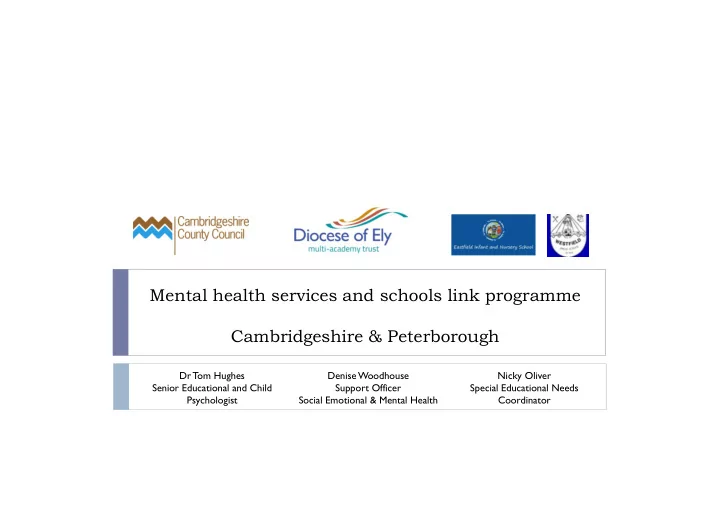

Mental health services and schools link programme Cambridgeshire & Peterborough Dr T om Hughes Denise Woodhouse Nicky Oliver Senior Educational and Child Support Officer Special Educational Needs Psychologist Social Emotional & Mental Health Coordinator
Mental Health Services and Schools Link Cambridgeshire & Peterborough workshops overview *4 *4 *35 *6 *1 39
Session overview A mental health A multi academy A school’s service provider’s Themes trust’s perspective perspective perspective Our local context Our local provision Building collaboration between mental health champions Auditing provision and self- assessment of wellbeing Acknowledging the importance of staff wellbeing Using the 5Ps of formulation Better understanding how we know we’re making a difference 40
Our local context 2 * local authorities 1 * clinical commissioning group c200,000 children and young people <19 (8 – 10% rise by 2023, 13 – 15% rise by 2025) Disparity of need c19,000 children and young people <16 experiencing mental health problems 41
Our local provision
Our local provision • Self-help websites (such as http://www.keep-your-head.com/cyp, https://kooth.com and https://www.minded.org.uk). • School Nursing service. • Kooth (direct access to an online counselling). • Cambridge and Peterborough NHS Foundation Trust single point • Parenting programmes (as part of neurodevelopmental pathway). of access. CHUMS (brief psychological interventions for children and young • • General practitioners and primary care. people aged 4 – 25). • Emotional Health and Wellbeing Practitioner team. • Special Educational Needs and Disability Service, • Education Wellbeing T eam and Special Educational Cambridgeshire County Council. Needs and Disability Service, Cambridgeshire • Various third sector organisations. County Council. • Various third sector organisations. • Core child and adolescent mental health services pathway (moderate to severe mental health needs that affect function / participation in daily life, including in- patient units). • First Response Service (for those in crisis 24/7 service). • Eating disorder pathway (moderate to severe Cambridgeshire, Peterborough and South Lincolnshire Mind anorexia or bulimia or avoidant and restrictive • (provision of crisis support for those aged over 16 years). food intake disorder). • Safety planning and expert support to professional networks • Neurodevelopment / learning difficulties pathway around young people. (including autism spectrum disorder and attention deficit and hyperactivity disorder). CAMEO (Cambridgeshire and Peterborough, assessing, managing • and enhancing outcomes) for early intervention in psychosis. • Transition service (child to adult mental health services).
Building collaboration between mental health champions NB: lower scores are positive 44
Building collaboration between mental health champions 45
Auditing provision and self-assessment of wellbeing • Define a clear process as to how students are prioritised for external support. Define a clear pathway (including processes for gathering consent, paperwork, • thresholds, timeframes, receiving bodies) for specialist mental health referral. • Publish links to the local transformation plan. • Publish links to the offers of external agencies (such as CHUMS, EH & WB Specialist practitioners, CAMHS) pathways Appoint a lead for liaison with external agencies. • Identify the school's emotional health and wellbeing practitioner and SEND link • practitioner. • Evidence the implementation of actions in school, through a rigorous 'assess, plan, do and review' process. Number of respondents Number of respondents (schools) that completed (schools) that completed the assessment in the assessment in June November 2016 2018 Stirling Children’s Well- 2,704 (13 schools) 2,469 (12 schools) being Scale (students) Warwick-Edinburgh Mental Wellbeing Scale Not applicable 313 (14 schools) (staff) 46
Acknowledging the importance of staff wellbeing Consistent with research (described by Roffey, 2017), correlational analysis between the Stirling Children’s Wellbeing Scale data and the Warwick- Edinburgh Mental Wellbeing Scale data indicate there is a positive, predictive relationship between student and staff wellbeing. 48.00 SCWBS mean (students) 46.00 44.00 42.00 40.00 38.00 40.00 45.00 50.00 55.00 60.00 WEMBWBS mean (staff) 47
Acknowledging the importance of staff wellbeing 48
49
Better understanding how we know we’re making a difference FUNCTIONAL BEHAVIOUR ASSESSMENT A B C 50
• tom.hughes@cambridgeshire.gov.uk • denise.woodhouse@demat.org.uk • noliver@eastfield.cambs.sch.uk 51
Recommend
More recommend